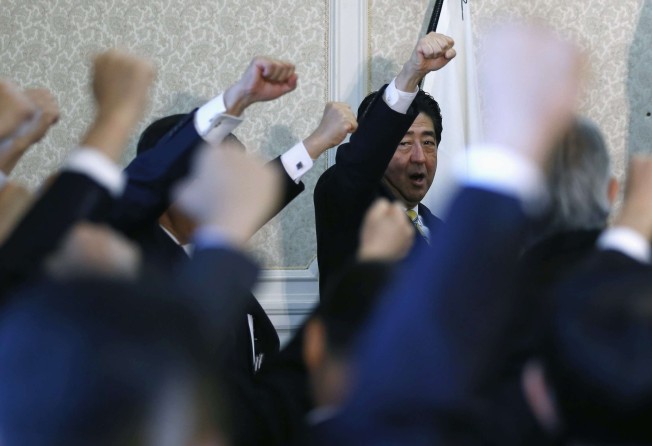Abenomics shows Japanese voters think hard about what’s best for the next generation
Shinzo Abe won office propounding a complex economic and monetary strategy. Would Donald Trump’s followers even know what a ‘monetary base’ is?

As an American, I must say that lately I’ve been jealous of almost any other country’s voter base. The level of political discourse seems more rational and advanced elsewhere.
In Japan, for instance, the still-popular Prime Minister Shinzo Abe won office propounding a complex economic and monetary strategy. Would Donald Trump’s followers even know what a “monetary base” is?
Yet after the Bank of Japan’s latest monetary gambit announced last week, one wonders if the country isn’t suffering from its own, quieter version of “Make Japan Great Again.”
Abenomics is a radical, risky scheme of economic revival, ostensibly motivated by two decades of slow growth and deflation. It is also motivated, however, by a prideful determination to maintain the country’s status as dominant economic power.
At one level, it’s pretty cool that a greying electoral base would rally behind such a programme – pensioners are pluckier than we thought.
Older voters are more active than younger ones in Japan, with 75 per cent of those in their 60s casting ballots, more than double the rate that citizens in their 20s do. But are these retirees voting rationally?
For instance, compare what the local elderly get out of Abenomics with what foreign investors receive. Pensioners get inflation, which eats into their savings and fixed incomes. Pensioners get zero yield income on their savings and bond holdings, thus their retirement fund payouts have been declining.
On the other hand, foreign investors, made a killing in the first years of Abenomics, when stock prices doubled and in some cases tripled.
Some international investors have since cashed out, but foreigners still own roughly a third of the Japanese equity markets, and are still raking in decent returns.
If Abenomics ever flames out, these investors can cut and run. It is the Japanese who are taking the long-term, structural risks.
Last week, the Bank of Japan announced a change in strategy but with an unwavering commitment to the ultimate goal: 2 per cent consumer inflation. The bank’s bond purchases will be made in an unscheduled, surprise fashion, with the aim of assuming absolute control on every stop along the yield curve. Equities soared on the news.
After four years of monetary excess, Japanese companies are bursting at the seams with cash. The hope was that businesses would respond by investing more – thus providing jobs and opportunities for Japanese citizens – but the result has been muted. So what to do with all this money?
“It is getting harder and harder to stash the cash,” says CLSA Japan strategist Nicholas Smith, who expects that companies start returning more cash to shareholders – including, of course, the foreign investors.
Other tailwinds for equities include the BoJ’s aggressive direct purchases of Topix and Nikkei exchange trade funds and the scope for pensions to ramp up their allocations to equities against zero-yielding bonds. Indeed, in Smith’s view the bond-heavy holdings is a losing strategy, and helps explain why pension-fund payouts have been on decline in recent years.
No other country has embarked on such a radical monetary expansion, nor has any other major economy accumulated as much debt to GDP as Japan. The rest of the world will get to see if this experiment works – but at a safe distance.
After all, many other countries face similar challenges. Much of Japan’s economic drag is related to demographics: as the labour market shrinks so will an economy.
Should the Japanese just accept their fading glory? After all, the standard of living in the country is still high, the streets are still safe, the food excellent, the skiing good, the air clean. Do they really need to risk it all for 2 per cent inflation?
Which brings us back to the original question – are Japanese voters crazy?
The optimistic answer is that older Japanese voters are unselfish. Perhaps they are thinking what is best for the young, who have felt stifled by slow growth and limited opportunities.
Cathy Holcombe is a Hong Kong-based financial writer
